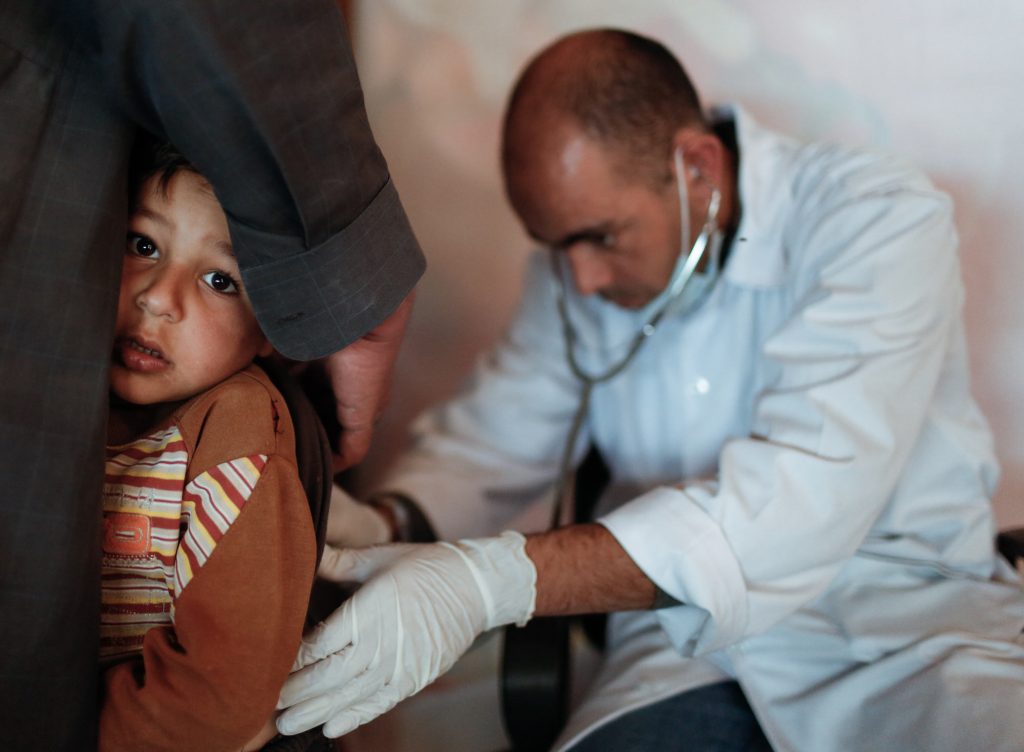
Disease Control
Family & Community Health
International Medical Corps works to help communities worldwide prevent and respond to communicable diseases, including Ebola, HIV, COVID-19, tuberculosis and malaria, as well as non-communicable diseases such as diabetes, hypertension and mental health conditions.
Close to 2 billion people each year are affected by infectious diseases—including neglected tropical diseases, which account for 1.7 billion annual cases in impoverished communities, in conflict zones and in the overcrowded conditions that so often exist in settlements for refugees and the internally displaced. In such places, poor sanitation, limited access to safe drinking water and often-inadequate health services combine to make conditions ideal for outbreaks of disease.
Between 1996 and 2023, the World Health Organization recorded more than 3,000 outbreaks of infectious disease globally, with the most frequently reported diseases being influenza, Ebola and MERS-CoV. In 2024 alone, there were 3.4 million confirmed Dengue cases, more than 150,000 cholera cases and more than 21,000 confirmed cases of mpox across 21 countries. In 2025, the Democratic Republic of the Congo (DRC) experienced another Ebola outbreak. The impact of these outbreaks is often compounded by frequent and catastrophic natural disasters.
A significant number of International Medical Corps’ responses have included technical assistance for the treatment and control of epidemic diseases, employing the “prevent, detect and respond approach.” Our worldwide staff includes physicians and public health specialists who coordinate global health responses and engage in pandemic preparedness activities.
Our goals are to:
- rapidly respond to outbreaks to save lives;
- improve epidemiological surveillance, prevention, detection and response to epidemic-prone diseases;
- contribute to health security and the protection of public health;
- contribute to the global goal of zero new HIV infections in newborns and to the 95-95-95 strategy, which has a goal that, by 2030, 95% of all people living with HIV know their status, 95% of people who know their status are on ART and 95% of those receiving ART achieve viral suppression;
- educate and inform populations on disease-control measures; and
- work with community partners to end practices that contribute to the spread of disease.
Our Response
At International Medical Corps, prevention and control of infectious disease outbreaks is always a priority, whether we’re responding to conflicts or natural disasters.
In 2024, when mpox cases surged globally, we supported the national response in the DRC by strengthening disease awareness—highlighting prevention strategies, early detection and critical health-seeking behaviour, and supporting two treatment centres in Kinshasa, providing them with more than 2,000 pieces of personal protective equipment and infection-prevention-and-control materials. In 2025, working with the Ethiopia Public Health Institute, we responded to mpox in Ethiopia by providing mpox-specific training for 47 health professionals in northwest and west Tigray, and by raising awareness in 13 health facilities and two sites for internally displaced people.
During the polio outbreak in Gaza in 2024, International Medical Corps vaccinated more than 8,700 children at our Al-Zawaida hospital and at partner-run mobile medical units.
In 2025, our team in DRC battled an Ebola outbreak by deploying a rapid response team to assess, plan and implement a response, and to conduct training on case management and infection prevention and control. We also procured medical supplies and led working groups on case management at the national and provincial level. In response to flooding in Venezuela, we deployed mobile clinics to provide access to healthcare in remote areas, and provided hygiene kits, as well as health and hygiene messaging, to community members to help prevent water- and vector-borne diseases.
In 2024, International Medical Corps ensured that nearly 350,000 children under 1 received three doses of DPT/penta as well as the measles vaccination.
Through the LEARN project, we are employing a “one health” approach to improve the timeliness, reach and coverage of multi-sectoral responses to outbreaks of infectious disease of epidemic or pandemic potential in humanitarian settings.